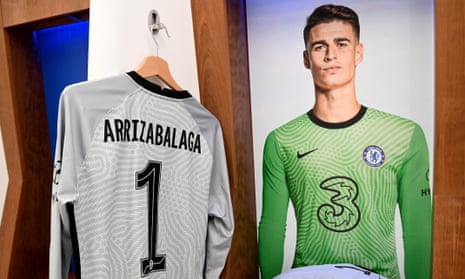So there you were, laid out on the grass, a long way from home. And as Liverpool celebrated their second goal, their whoops and cheers burned your ears, and as your teammates solemnly turned their backs, their silence did the same. And the grass felt cold beneath you, but you were grateful for it all the same. Because without it, you felt like you would never stop falling.
And you thought about the hills around Ondarroa, the little Basque fishing village where you grew up, and those hot summer days when you would climb the tall beech trees trying to catch goldfinches. Occasionally you would lose your grip, feel the awful scrape of your foot down the bark and just fall, and as you fell you would remember the words of your father: if the fall doesn’t hurt, then you didn’t climb high enough.
You know this is the end. Not The End, but the end at Chelsea, and you know you have nobody to blame but yourself. Still, there’s a part of you that has never been able to grasp the malice of it all, the sheer pleasure some take in the pain of others. The cruel jokes. The insistence on calling you the “£71m Kepa”, like it was something you went around calling yourself. Like it was your name. Whatever some panicking billionaire thought you were worth in the dying hours of the 2018 transfer window, what business was it of yours?
You think back to one of your first conversations with Frank Lampard last summer. You said you were still trying to understand the culture of England. You meant the culture of goalkeeping in England: the way referees don’t protect you, the way everyone expects you to shout and point like an idiot, the way opposition crowds go: “Wooooah,” when the ball comes to you.
But Frank misunderstood and so over the next few weeks he would keep leaving little English-themed gifts in your locker at Cobham, each accompanied by a little personal note. A Paddington Bear toy. “Best, Frank.” A Winston Churchill biography. “Best, Frank.” A bottle of something called HP Sauce. “Best, Frank.” A DVD of a television show called Only Fools and Horses. “Best, Frank.”
One winter’s evening, you slipped on your Harrods pyjama bottoms (“Best, Frank”) and watched the DVD from start to finish. You didn’t get all the jokes, even with subtitles, but you still liked it. What you found most interesting was the way the humour of the show was built on failure. The futility of these two brothers and their schemes, how they kept messing up and how the British audience just kept laughing. And when, in the end, they found a rare watch and became millionaires, all the humour seemed to evaporate in an instant. Because, you realised, deep down the audience had been rooting for them to fail all along.
And you remembered that time Mason Mount took you to a farmer’s market in Surbiton, with all the sweet‑smelling street food stalls, and made you try something called a buddha bowl. And you asked him why it was called a buddha bowl and he didn’t really know, it was just a bowl with some brown rice and salmon and greens: not mixed, but arranged in little piles and covered in a tasty dressing and you understood that part, but still you didn’t quite grasp the link between the spiritual teachings of Buddhism and an artfully arranged £8 bowl of grains and vegetables, and Mason just shrugged and said: “Well it’s healthy, so it’s probably the sort of food the Buddha would have liked,” and you left it there.
Anyway, there was a long queue at the stall and then you had to wait ages even though Mason got his straight away and just as the guy was handing over your bowl you heard a voice behind you: “Kepa!” And you spun round to look and as you did your arm knocked against the metal pole holding up the stall: not hard, but enough to knock the buddha bowl out of your hand and as brown rice and edamame and beetroot went flying, as teriyaki dressing rained down on Mason’s new Balenciaga shoes, you could see the sneering faces, hear the scornful laughter, feel the searing heat of a dozen phone cameras pointed in your direction.
“Should have tried to punch it, Kepa,” sniggered a tall man in rimless glasses, and that made you angriest of all, because why on earth would you punch a bowl of food?
Remember the goldfinches? You used to keep them, feed them little treats of thistle and hemp seeds, train them to sing. The key to training goldfinches – as everyone knows – is time and care. Being caged is an unnatural, distressing environment for a young bird, who can’t yet tell what’s harmless and what’s a predator. They need shelter, protection, reassurance. Give it to them and eventually the older birds will teach them to sing. Try to rush or force the process and they end up trapped in a vicious cycle of fear and flight: disoriented, distrustful, erratic.
So there you were: laid out on the grass, a long way from home, a caged bird without a song. Though your thoughts were a blur of faces and fates, of derision and dashed hopes and save percentages and Édouard Mendy flying into London to sign a five-year contract, still you smiled. Not a broad smile but a small interior smile, not a smile of triumph or contrition, but relief. Because it hurt.

